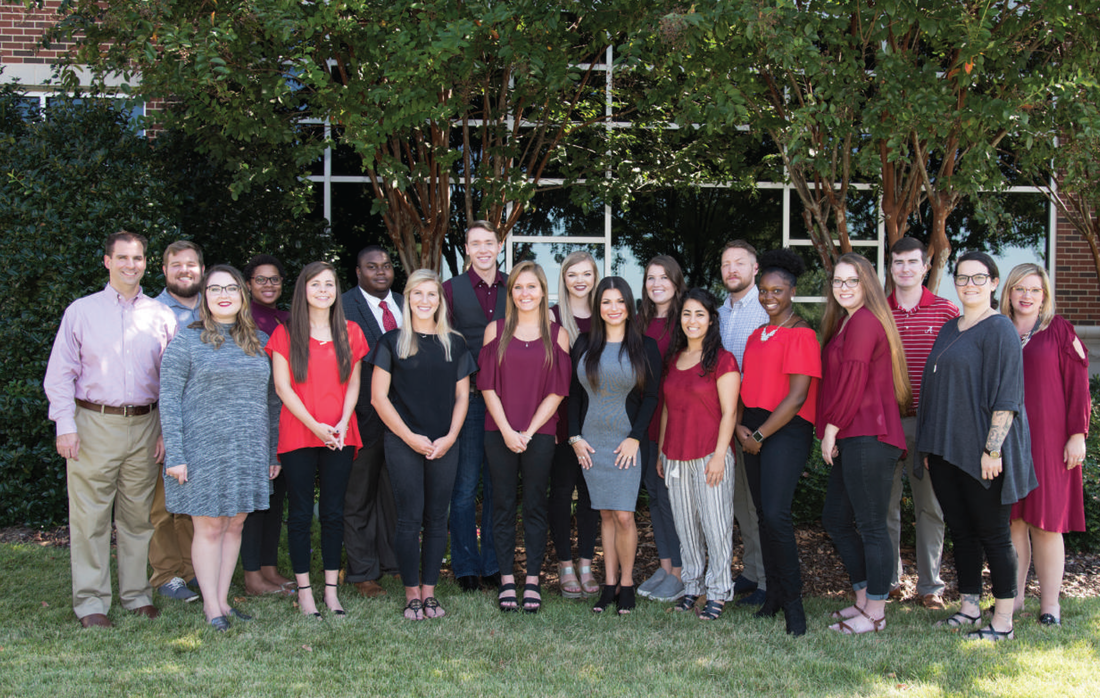They are fully prepared, confident clinicians ready to create successful and positive outcomes. |
A Focus On RelationshipsGraduate students gain real-world experience in UA clinic.
Erica Kelly has seen her fair share of cases over the past year while working as a student therapist at the Capstone Family Therapy Clinic. She’s worked with clients dealing with anxiety, depression, interpersonal violence, parenting concerns, marital conflict, substance abuse/addiction and more. “The experience I have had at the clinic has helped me identify who I am as a therapist,” says the 23-year-old second-year graduate student from Cullman, Ala. “The things I’ve learned have become somewhat second nature to me and will be very beneficial as I start my private practice.” Kelly is one of nearly a dozen student therapists at the clinic, which serves as an “in-house internship site” for graduate students specializing in marriage and family therapy. While the name might lead you to believe this field focuses solely on couples or families, marriage and family therapists see a broad range of clients. “What sets us apart from other mental health disciplines is the focus on family systems and relationships,” says Dr. Blake Berryhill, program director. “We focus on relationships in our profession, whether it be with couples, families, or an individual. For example, if an individual comes in and they’re experiencing depression or anxiety symptoms, we want to know what other relationships in their life can offer support, but also what other relationships might be contributing to those symptoms.” In order to achieve the first level of licensure upon graduation, students must have 500 direct client contact hours— 250 individual and 250 couples and families. Students begin working at the Capstone Family Therapy Clinic in the second semester of the two-year graduate program. They also are placed at outside internship sites in schools, private practices, and different treatment facilities. In the clinic, student therapists learn to work with many issues, including marriage, relationship or family problems; stress at work or home; alcohol or drug addiction; grief and loss; loneliness; communication problems; depression or mood swings; eating disorders; anxiety; family stress related to physical or mental illness; and parenting skills. “What’s great about our training is that our students can really do a lot,” says Dr. Karly Downs, director of clinical training. “They are trained to identify all the different facets of family that are influencing the identified problem and how to address those.” “They also are trained to take into account the cultural context of the individual or family, because culture impacts beliefs and attitudes concerning certain things,” Berryhill says. When students graduate, they can do a number of things — open their own practice, work for a mental health agency or varied treatment centers, pursue a Ph.D. or provide nontherapeutic services for outside agencies, such as a nonprofit. “The most valuable thing to me has been the supervision,” Kelly says. “Dr. Berryhill and Dr. Downs have helped methrough many tough sessions and cases. Whether it be cultural differences, trauma history, situations in which I must report abuse, hospitalizing a client or something like safety planning in cases of IPV (Intimate Partner Violence), being a new therapist, these situations can be overwhelming. They have taught us what to do and are always right there with us as we take the steps needed to help our clients.” Beyond helping the students work through cases, Kelly says Berryhill and Downs also make sure the student therapists take care of themselves so they can continue to care for their clients. “As therapists we hear many tough things that our clients have experienced and that can be difficult,” she says. “Sometimes it’s easy to forget we are human and can have emotional reactions to these things and that we really cannot carry them with us.” While the focus is training the students on evidence-based models, there is much more to being a therapist. Part of the program also focuses on how to be a professional and taking what is learned in the classroom and applying it when students meet with clients. “When they leave here, students are confident in their skills and abilities to work with the full array of mental health issues and family dynamics that are out there,” Downs says. “They are fully prepared, confident clinicians ready to create successful and positive outcomes for all types of clients.” The clinic operates from 8 a.m. to 7 p.m. Monday through Friday and charges a sliding scale fee based on a client’s ability to pay. If a client requires medication, clinic staff will provide a referral to another physician or psychiatrist. “In the end, it’s all about client care and making sure our clients are getting the help they need,” Berryhill says. |
| Reunion Magazine | REUNION MAGAZINE |


